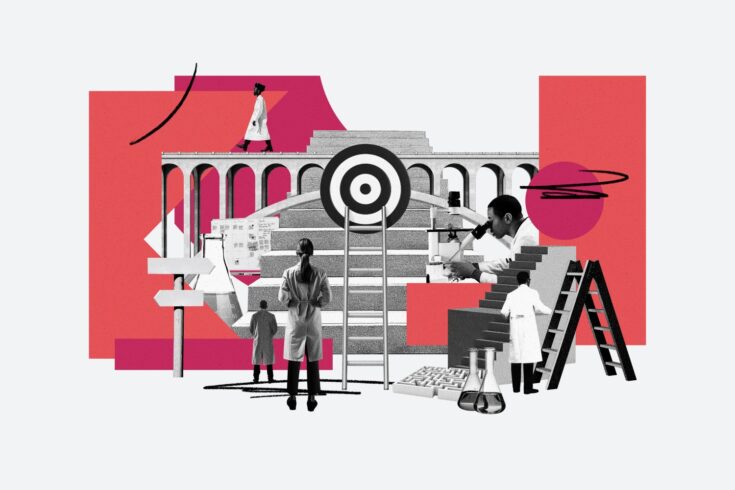I had a narrow view of what an academic career looked like when I joined the Economic and Social Research Council (ESRC) 20 years ago. To be fair, I wasn’t alone in thinking that a career in academia was a linear path through the halls of academia.
It reflected my own experience of studying politics at university as an undergraduate and postgraduate and then working with universities in my first years at ESRC.
It was working on a joint ESRC, Biotechnology and Biological Sciences Research Council (BBSRC) and Natural Environment Research Council (NERC) rural economy and land use programme more than 10 years ago that began to open my eyes.
It was innovative for its time in its approach to interdisciplinary working and support for people exchange and mobility. I was seeing for the first time how movement of people between academia, business and government improved the quality and impact of research. I could also see the barriers to that mobility.
Too many conversations I have with students and postdoctorals today continue to reflect a narrow view of what a successful career in research and innovation looks like.
The perception remains that you are somehow a second-class citizen if you are not an academic and that what you publish is the key to your success.
Lack of movement hampers our efforts
We want to see more people moving both ways between academia, government and business. I fear lack of movement is reducing opportunities for individuals and hampering our efforts to do world-leading research and innovation to address complex challenges such as reaching net zero and supporting an ageing population.
Yes, we are a world-leading researcher and innovator, but I’ve seen many reviews and studies make the same point that knowledge is siloed, and we must do more to bring research and innovation communities together.
Last year’s independent Nurse review of the research, development and innovation organisational landscape talks about fostering ‘permeability of ideas, technologies and people in both business and academia’.
People and their teams are at the heart of everything we do in research and innovation. They are the ones who have the ideas, and they are the ones who develop the technologies.
Movement spurs creativity and knowledge exchange
It is vital that we have more people moving much more between sectors. It builds connections, joins up thinking, encourages creativity and knowledge exchange and supports adoption of research and innovation.
I represented UK Research and Innovation (UKRI) on the taskforce that produced the recent National Centre for Universities and Business report ‘Pathways to Success’.
It highlighted the additional benefits of career mobility to individuals, including a broader understanding of applications for their research, wider personal networks and the opportunity to build personal skills and improve salaries.
Switching sectors widens experience
Building on 101 jobs, ‘Switching sectors’ showcases some of the personal and research successes that have grown out of career mobility. I’ve seen lots of impressive stories.
Ashmita Randhawa left India to study biomechanical engineering in the US, moved to Brussels to work on consumer products at Procter and Gamble, then gained an interest in skills development that she decided to pursue at Oxford University.
She is now acting as a bridge between academia and university in her role as director of research and development and lead for Digital Catapult North East Tees Valley at Sunderland Software City.
I’m inspired hearing Ashmita talk about how she learned different things from her respective roles and how she uses that now to build teams and trust in her current job.
Video credit: UK Research and Innovation
Video transcript and on-screen captions are available by watching on YouTube.
There are many paths to success
All of us in academia, business and government must continue to promote and value this sort of movement between sectors. We must recognise that there are many ways we can do this and that this should include part-time roles, secondments and placements as well as full-time permanent jobs.
At UKRI, we are promoting career mobility through a range of opportunities that we fund. See the ‘further information’ section for links to our programmes that support cross-sector mobility.
We are increasing the number of students who take industry placements through our doctoral training investments and strengthening expectations on organisations, supervisors and students to explore a broad range of careers.
I was interested to see in a recent evaluation that 60% of BBSRC-funded doctoral students surveyed felt their career ideas had changed due to a placement.
We’re also encouraging greater awareness of career options for postdoctorals through our investments in such programmes as the Prosper initiative and the Centre for Postdoctoral Development in Infrastructure Cities and Energy.
To support flexibility, we are widening eligibility for grants, removing barriers to support for specialist roles and increasing recognition of different roles.
Former army captain examines our future security
I was in Manchester in February for the annual meeting of our 550 future leaders fellows and was amazed at the diversity of careers I encountered among the delegates.
This programme is designed to support talented people whether they are based in universities, businesses or other research and innovation environments. We use Résumé for Research and Innovation (R4RI), which is designed to recognise a wider range of skills and experience than a traditional academic CV.
Dr Patrick Bury is a great example. He is a former British Army captain and North Atlantic Treaty Organization analyst. He is now a reader in security at the University of Bath and was awarded a Future Leaders Fellowships to examine the transformation of transatlantic counter-terrorism in partnership with an international network of experts.
Elements of his earlier work have already helped to develop British defence policy, and it will be no surprise to see his current work helping to improve security for all of us.
Video credit: UK Research and Innovation
Video transcript and on-screen captions are available by watching on YouTube.
We must change our perception of success
It’s clear we must change our perception of what success looks like and move beyond an emphasis on publications.
Of course, the academic outputs of research are important, but we need to expand our definition of research excellence to ensure appropriate recognition and reward is given to the people, culture and environments that are key to a vibrant and sustainable UK research system.
You’ll see that coming through in the REF 28 exercise, which helps to inform decisions on the allocation of around £2 billion of block-grant research funding each year.
We’re also examining our processes for allocating our project-based grants to see how they can better recognise and support the diversity of roles and careers in research. This is building on work we have already done to widen eligibility for our grants.
Great science is a team endeavour
What we are saying is there’s a diversity of people and many routes. People should be able to move across different sectors more easily, move across different disciplines and forge different collaborations.
I see that so much great science and research is a team endeavour. My role is to think about how we support that breadth of people and really understand the contributions they make.
I’m convinced that if we can tap into the talent, wherever they are and whatever their path, our research and our people will be richer for it.
Further information
Schemes that support cross-sector mobility
Impact Acceleration Accounts
Councils involved: UKRI, Arts and Humanities Research Council (AHRC), BBSRC, ESRC, Engineering and Physical Sciences Research Council (EPSRC), Medical Research Council (MRC) and Science and Technology Facilities Council
Funding type: award via institution
Institutions use Impact Acceleration Accounts funding to rapidly develop research outcomes from our other funding. These activities often involve cross-sectoral working and interaction and can fund placements and secondments.
For ESRC Impact Acceleration Accounts, see: Impact Acceleration Accounts – ESRC.
Future Leaders Fellowships
Councils involved: UKRI
Funding type: fellowship
Future Leaders Fellowships is a flagship UKRI programme that funds fellowships across all sectors, thus enabling the opportunity for long-term, career-changing mobility and the movement of skills.
Innovation scholars secondments
Councils involved: UKRI, AHRC, BBSRC, EPSRC, MRC, Innovate UK
Funding type: grant
The innovation scholars secondments scheme funds flexible, cross-sectoral secondments. Funding opportunities have been offered in biomedical sciences, architecture and design. This scheme directly enables mobility of people and the cross-sectoral element is an eligibility requirement.
Innovation Fellowships
Councils involved: EPSRC
Funding type: fellowship
Funded in 2017 by the National Productivity Investment Fund (NPIF), Innovation Fellowships enabled close working between academia and business, resulting in the intersectoral movement of information and skills.
Prosperity Partnerships
Councils involved: EPSRC
Funding type: grant
Prosperity Partnerships is a flagship EPSRC led programme that funds intersectoral research programmes between business and academia.
These large, long-term grants provide many opportunities for cross-sector mobility and the exchange of skills and ideas.
Local Policy Innovation Partnerships
Councils involved: ESRC
Funding type: centres
ESRC funded four Local Policy Innovation Partnerships to bring together devolved governments, local authorities, local businesses and local communities to harness the power of research and innovation in addressing local challenges.
These centres have driven cross-sectoral working related to policy and social sciences research, moving people, and exchanging skills and knowledge.
Parliamentary Thematic Research Leads
Councils involved: ESRC
Funding type: grant
The UK Parliament and ESRC piloted the Parliamentary Thematic Research Leads roles. Evidence suggests that these prestigious and influential roles are making a positive impact, transferring skills, ideas and people.
As a result, in 2024, parliament will partner with UKRI to expand its network of Thematic Research Leads across a wider range of academic disciplines and policy areas.
UKRI Policy Fellowships
Councils involved: UKRI, AHRC, BBSRC, ESRC
Funding type: fellowship
The UKRI Policy Fellowships enhance the relationship between academia, government and research organisations (such as What Works Centres) by improving the flow of evidence, insights and skills by cross sectoral movement of people.
Industrial Strategy Challenge Fund ‘Enabling Research’ call
Councils involved: NERC
Funding type: grant
Through the Enabling Research call, the funded universities worked closely with partners from across the plastics sector to ensure solutions were responding directly to industry needs. This close working drove cross sector mobility and the exchange of skills and ideas.
Changing the environment awards
Councils involved: NERC
Funding type: grant
Changing the environment awards created new communities to deliver solutions for environmental challenges, taking a whole system approach, drawing across the breadth of appropriate UKRI disciplines.
Cross-sectoral partnerships were required to deliver this, creating many opportunities for cross-sectoral working and the exchange of skills, ideas, and knowledge.
Knowledge exchange fellowships
Councils involved: NERC
Funding type: fellowships
NERC knowledge exchange fellowships enable movement of people between sectors to enhance knowledge exchange and drive innovation.
Knowledge Transfer Partnerships
Councils involved: Innovate UK
Funding type: grant
Knowledge Transfer Partnerships (KTP) is a long-established programme that links innovative businesses with academic skills and knowledge. A partnership is formed between a knowledge exchange organisation and a business or charity with a KTP associate employed to manage the project.
These opportunities provide the possibility of career mobility for the associate and drive the transfer of skills, information and knowledge.
Analysis for Innovators
Councils involved: Innovate UK
Funding type: grant
The Analysis for Innovators grant enables the UK’s top scientists, using their world-class facilities, to work with companies to address problems in innovative ways. Brokerage meetings foster cross-sectoral working and enable the transfer of skills and knowledge thus boosting a company’s productivity or competitiveness.
Placements and internships for UKRI Doctoral Students
Councils involved: UKRI
Funding type: placement and internships
Councils provide funding as part of their doctoral training investments to give students the opportunity to undertake placements within other sectors, for example the BBSRC Professional Internships for PhD Students and ESRC Research in Practice placements. They run a cross-UKRI Policy Internships scheme that provides three-month internships for UKRI-funded students at policy organisations.
Academy of Medical Sciences policy internships
Councils involved: MRC
Funding type: internship
Academy of Medical Sciences policy internships allow students on MRC-funded programmes to spend time in medical policy environments, allowing them to gain skills they would not otherwise have and allowing them to work across sectors.
Flexible Talent Mobility Accounts
Councils involved: BBSRC
Funding type: award (via institution)
Flexible Talent Mobility Accounts support placements and exchanges for bioscience research staff from and to universities, BBSRC institutes, businesses, policy, or other settings in the UK and overseas.




